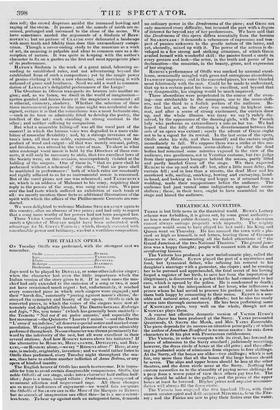THE ITALIAN OPERA.
ON Tuesday Otello was performed, with the strongest cast we remember.
Otello RUBIN'.
logo TA MBU RINI.
Elmira Z n ELM.
Roderigo IVA:UK/FE. Desdetoona CRIS/.
'ago used to be played by DEVILLE, or some other inferior singer ; when the character lost even the little importance which the Italian version of the story gives to it. If in such cases the mis- chief had only extended to the omission of a song or two, it need not have occasioned much regret : but, unfortunately, it reached every concerted piece in which such singers were engaged ; and their "harsh din," constantly "jarring against music's chime," de- stroyed the symmetry and beauty of the opera. Otello is rich in concerted pieces, in which the voices of the singers were now al- ternately and delightfully blended. The Duetto between Roderigo and Iago, "No, non temer" (which has generally been omitted)— the Terzetto " Nel cor d' un padre amante," and especially the last movement—the Quintet to " I ncerta l' anima "—and the Duetto "L' error d' un infelice," all deserve especial notice and marked com- mendation. We enjoyed the unusual pleasure of an opera admirably performed throughout. No one character was thrust prominently for- ward by the inferiority of the rest, but all were excellent in their several stations. And how Rosman towers above his imitators ! If the alternative be ROSSINI, MERCADANTE, DONIZETTI, and BEL- LINI,—or Rosman alone,—we say "Rossi xi alone /" Here, at any rate, is melody, originality, invention ; and we would rather listen to • Otello thus performed, every Tuesday night throughout the sea- son, than have to endure another infliction of Anna Bolena, or any opera of kindred inanity. The English hearer of Otello has much toovercome. It is impos- sible for him to avoid certain disagreeable comparisons. Otello, the noble Othello of our stage, sinks into a character half-ruffian half- idiot ; lap') is a tame, insipid villain ; Desdemona, a compound of unnatural affection and ungoverned rage. All these changes are so many hindrances of enjoyment—we would fain recognize the Othello of SH A KSPE ARE in the Moor of the Marquis in BERI 0 ; but no stretch of imagination can effect this—he is a mete relent- less brute. To bear up against such an antagonist force, demands no ordinary power in the Desdemona of the piece; and GRIST not only mastered every difficulty, but invested the part with a degree of interest far beyond any of her predecessors. We have said that the Desdemona of this opera differs essentially from the heroine of SHAKSPEARE: it demands a vehemence of expression and tem- pest of passion unknown to the gentle nature of the latter, and yet, absurdly, mixed up with it. The power of the actress is de- veloped in a few strong and striking situations, of which GRIM availed herself with wonderful skill : the painter found a study in every gesture and look—the actor, in the truth and power of her declamation—the musician, in the beauty, grace, and expression of her singing.
Roman's performance of Otello was marked by unusual excel- lence, occasionally mingled with gross and outrageous absurdities. IVANHOFF improves ; and in the concerted pieces, his voice blended most felicitously with the rest. Could he be made to understand, that up to a certain point his voice is excellent, and beyond that very disagreeable, his singing would be much improved. Three absurdities were perpetrated in the course of the even- ing—one attributable to the managers, one to the scene-shift- ers, and the third to a foolish portion of the audience. Be- fore the last act, as the story was reaching its highest inte- rest, and after a scene of strong excitement, the curtain drew up, and the whole illusion was (may we say ?) rudely dis- solved, by the appearance of the dancing-girls, with the French lady who performs so extraordinary a solo on her toe. We had hoped that the folly of thrusting a divertissement between the acts of an opera was extinct : surely the advent of GRISI ought not to be a signal for its revival. In the last scene of the opera, Otello stabs his wife, and then himself; and the curtain ought immediately to fall. We suppose there was a strike at this mo- ment among the gentlemen scene-shifters; for after the dead bodies had remained some minutes exposed to the view of the audience, two gentlemen, not in Venetian costume, but (we judge from their appearance) loungers behind the scenes, partly lifted and partly heeded GRIST off the stage. We then expected RUBINI to rise up and walk off: but, after a little more delay, the curtain fell ; and in less than a minute, the dead Moor and his murdered wife, smiling, smirking, bowing and curtseying, hand- in-hand, and looking as loving and happy as if returned from a wedding, made their reappearance before the audience. The audience had just vented some indignation against the scene- shifters ; these, in their turn, ought to have assembled on the stage and hissed the audience.






















 Previous page
Previous page